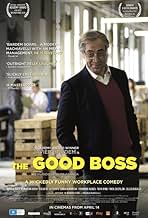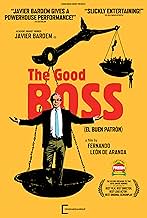El buen patrón
- 2021
- Tous publics
- 1h 56min
NOTE IMDb
7,1/10
16 k
MA NOTE
Dans l'attente de la visite d'un comité qui pourrait décerner à son entreprise un prix d'excellence, le propriétaire d'une entreprise de fabrication de balances industrielles tente de résoud... Tout lireDans l'attente de la visite d'un comité qui pourrait décerner à son entreprise un prix d'excellence, le propriétaire d'une entreprise de fabrication de balances industrielles tente de résoudre les problèmes de ses travailleurs.Dans l'attente de la visite d'un comité qui pourrait décerner à son entreprise un prix d'excellence, le propriétaire d'une entreprise de fabrication de balances industrielles tente de résoudre les problèmes de ses travailleurs.
- Réalisation
- Scénario
- Casting principal
- Récompenses
- 34 victoires et 48 nominations au total
Yaël Belicha
- Inés
- (as Yael Belicha)
Nicolas Ruiz
- Hijo de Jose
- (as Nicolás Ruiz)
Avis à la une
It would appear comforting that there are still companies out there that genuinely care about the welfare of their employees, treating them like members of a big, loving family. And that's the image that Blanco Scales tries to convey, one that's placed the organization in the running for a regional business award, one of many such honors it has received over the years. Making this possible is the company's owner, a kindly paternal sort who seems concerned about the well-being of his staff - that is, insofar as it affects the company's welfare. This approach, however, often leads to undue meddling in the lives of workers, so much so that the boss will go to almost any lengths to achieve his goals by way of his employees and their families, especially when it comes to reflecting the proper image he's trying to project, a practice ultimately fraught with troubling complications. Writer-director Fernando León de Aranoa's latest serves up a biting satire about the business world and the extremes to which businesses will go to present squeaky clean, politically correct portraits of themselves to an easily gullible public, tactfully burying the compromises and questionable tactics they often must do in realizing that goal. This offering is a perfect vehicle for Javier Bardem as the oily protagonist, playing the part with just the right amount of insincerity to be convincing without looking cartoonish, in a role backed by a superb ensemble of supporting characters. It's regrettable that the picture gets off to a painfully slow start during much of the first hour, but the film more than makes up for this shortcoming in the second half, turning wickedly funny and occasionally disquieting in the second half. Be patient with this one, giving it ample time to develop; you won't be disappointed with the payoff.
What makes for a Good Boss? Successful in business. Dedicated to the company. Loyal to his workers. At first glance Blanco (Javier Bardem) seems to check all the boxes and more. Blanco runs a respected corporation building weight scales. He's charming, handsome and loves to get up close and personal in all his affairs.
Writer-Director Fernando Leon de Aranoa sets in motion a fairly simple plotline. Blanco's company is up for a prestigious industry award. Within a few days, an official committee will be touring his factory and offices to see if they are worthy. As expected, over those days little fires start popping up: A disgruntled worker (Oscar de la Fuente) is laid off, a pretty new intern (Almudena Amor) catches Blanco's eye, his trusted Production chief (Manolo Solo) is letting his home issues affect his work etc. Etc..
At first, these seem like petty issues which Blanco can put out without much muss amounting to small nuisances on the way to the next prized plaque in his trophy case. De Aranoa's script and direction are sharp. Little details are cleverly dropped in at precisely the right moment. As they accumulate, the story becomes a sly, dark satire. Bardem's breezy charisma is clear and ever-present, but, the actor subtly reveals a more steely side. The supporting cast is strong with Zeltia Montes' score boosting them along for the ride.
In the end the cynical capitalist message is that to be a truly 'Good Boss' one only has to think about what benefits only a single person no matter how large the corporation: YOU.
THE GOOD BOSS was last year's official Best International Film Oscar submission by Spain somewhat controversially edging out Almodovar's excellent PARALLEL MOTHERS. Both are really fine movies that are certainly worth seeing.
Writer-Director Fernando Leon de Aranoa sets in motion a fairly simple plotline. Blanco's company is up for a prestigious industry award. Within a few days, an official committee will be touring his factory and offices to see if they are worthy. As expected, over those days little fires start popping up: A disgruntled worker (Oscar de la Fuente) is laid off, a pretty new intern (Almudena Amor) catches Blanco's eye, his trusted Production chief (Manolo Solo) is letting his home issues affect his work etc. Etc..
At first, these seem like petty issues which Blanco can put out without much muss amounting to small nuisances on the way to the next prized plaque in his trophy case. De Aranoa's script and direction are sharp. Little details are cleverly dropped in at precisely the right moment. As they accumulate, the story becomes a sly, dark satire. Bardem's breezy charisma is clear and ever-present, but, the actor subtly reveals a more steely side. The supporting cast is strong with Zeltia Montes' score boosting them along for the ride.
In the end the cynical capitalist message is that to be a truly 'Good Boss' one only has to think about what benefits only a single person no matter how large the corporation: YOU.
THE GOOD BOSS was last year's official Best International Film Oscar submission by Spain somewhat controversially edging out Almodovar's excellent PARALLEL MOTHERS. Both are really fine movies that are certainly worth seeing.
1) If you wanna enjoy this movie, lower your expectations, this is not 10/10 or 9/10.
2) It's probably a comedy/drama movie, not dark enough to be a dark comedy. You will laugh, there are some hilarious moments, but this is not a comedy. There are also some dramatic moments, but it's not a drama either.
There is a "light tone", some underlying social commentary, but you will enjoy this regardless your political ideology. If you want to watch a movie that declares war against capitalism, this is not your movie.
3) Bardem gets all of the praise, and he is indeed very good, however, every actor here does a good job.
4) It is a good movie to spent 2 hours. Not a "must watch". First 20 minutes are boring. As it progresses, it is becoming more interesting and the pacing keeps getting better. Don't look for something great, and you will enjoy it.
2) It's probably a comedy/drama movie, not dark enough to be a dark comedy. You will laugh, there are some hilarious moments, but this is not a comedy. There are also some dramatic moments, but it's not a drama either.
There is a "light tone", some underlying social commentary, but you will enjoy this regardless your political ideology. If you want to watch a movie that declares war against capitalism, this is not your movie.
3) Bardem gets all of the praise, and he is indeed very good, however, every actor here does a good job.
4) It is a good movie to spent 2 hours. Not a "must watch". First 20 minutes are boring. As it progresses, it is becoming more interesting and the pacing keeps getting better. Don't look for something great, and you will enjoy it.
By Maryam Tavatav (Critic)
Directed by Fernando Leon de Aranoa, "The Good Boss", as the representative of Spanish cinema at the 2021 Academy Awards, explores societies based on political-economic and capitalist systems and narrates becoming the number one in the workplace at any cost.
Blanco is the owner of a factory of industrial scales. This mere choice of scales connoting justice begins the chain of symbolism in this film. Throughout his speeches and interaction with others, Blanco manifests himself at the beginning of the story, as a compassionate, sympathetic boss who is willing to do anything for his factory workers. He keeps retelling this key phrase: "Every employee's problem is mine" and this is a fallacious statement that has been repeated over and over again throughout the organization's history causing all workers to believe in its legitimacy. However, another truth emerges as the film proceeds.
The film's main plot is based on this question: beyond this technicolor of slogans the capitalists chant in support of the workers, is their true face as sympathetic and benevolent as they look before the public and media? It remains to be seen to what extent these pretender capitalists adhere to moral statements when a tiny margin of their capital is jeopardized. This view does not contradict the concept of capital since the circulation of capital in society will certainly bring about economic prosperity that might be beneficial to the people. Meanwhile, the main point is how this benefit is to be distributed. Do people share in the benefits as much as they have contributed to the generation of wealth?
What elements must be in place in this cycle to achieve a higher level of assets? At this point, the main conflict is created; where various economic and political schools have made an attempt to come up with an answer. The script of a good boss also brings to light the extent of adherence to principles that are challenged in the face of a financial crisis and where the interest of employees comes into play. Simply put, when a problem occurs at the heart of the factory, despite Blanco's pretentious conduct favoring the workers, the manpower becomes the means to add just one more award to the wall of the owner's house at any cost. This comedic nature of the film, in a dark setting, mocks Blanco's superficial view of the fate of his workers. The film's final scene illustrates framed awards, with writings such as "Justice", here and there on the factory's walls, while its atmosphere is still filled with corruption and inequality.
The Good Boss can be introduced as the most allegoric and figurative film of the year considering its abundant use of meaningful symbols. The irony depicted in the film regarding the sense of justice and benevolence demonstrates that the director's preoccupation is way beyond a mere worker-employer incompatibility in the workplace. Behind Blanco's apparent good-naturedness in the guise of a spiritual father lives another human being: a man enjoying inheritance who is willing to do anything to preserve his capital so that he can add a framed award to those of others on the walls of his factory, lest a single penny be deducted from its capital; He somewhat represents a capitalist society that is willing to crush everything under the boots of power for the sake of achieving its material goals. Herein, the power relations are predefined and the authority is exclusively in the hands of a few and the others may enjoy a marginal benefit out of their vast fortune through deceitfulness. In fact, the concept of meritocracy and effort is the overlooked component of such thinking.
The element of surprise, which seems to be missing in almost all films these days, is well implemented in this film. The first impression that Blanco leaves on the audience is one sympathetic boss who follows the recent concepts in management science and perceives his workforce as the capital of his factory, while in the second half of the film, his true character is revealed once Blanco is put in a situation that his interests are at stake.
The brilliant performance of "Javier Bardem" in the leading role of this film must not be neglected. He shows such a dramatic personality change in his role that the viewer fully understands the nuances of his characteristics; his acting thoroughly serves the film's purposes and helps advance the narrative. The presence of influential supporting roles and sub-characters has also contributed to the completion of this puzzle and created an effective flow of transformation. The Good Boss possesses a professional cast of actors who have done well in their roles. The use of symbols and attention to detail have played a major role in expressing the main concept and theme of the film, especially when the seeds planted earlier are harvested and these symbols are used in the ending.
This film is a fine example of how deep political-economic concepts, whose presence is a grave concern in human life, can be sharply criticized with the correct and principled use of humor and comedy. Fierce criticism of political and economic structures does not necessarily require the production of serious films; rather one can voice the most serious criticisms by making a comedy film and force the viewer to contemplate.
Directed by Fernando Leon de Aranoa, "The Good Boss", as the representative of Spanish cinema at the 2021 Academy Awards, explores societies based on political-economic and capitalist systems and narrates becoming the number one in the workplace at any cost.
Blanco is the owner of a factory of industrial scales. This mere choice of scales connoting justice begins the chain of symbolism in this film. Throughout his speeches and interaction with others, Blanco manifests himself at the beginning of the story, as a compassionate, sympathetic boss who is willing to do anything for his factory workers. He keeps retelling this key phrase: "Every employee's problem is mine" and this is a fallacious statement that has been repeated over and over again throughout the organization's history causing all workers to believe in its legitimacy. However, another truth emerges as the film proceeds.
The film's main plot is based on this question: beyond this technicolor of slogans the capitalists chant in support of the workers, is their true face as sympathetic and benevolent as they look before the public and media? It remains to be seen to what extent these pretender capitalists adhere to moral statements when a tiny margin of their capital is jeopardized. This view does not contradict the concept of capital since the circulation of capital in society will certainly bring about economic prosperity that might be beneficial to the people. Meanwhile, the main point is how this benefit is to be distributed. Do people share in the benefits as much as they have contributed to the generation of wealth?
What elements must be in place in this cycle to achieve a higher level of assets? At this point, the main conflict is created; where various economic and political schools have made an attempt to come up with an answer. The script of a good boss also brings to light the extent of adherence to principles that are challenged in the face of a financial crisis and where the interest of employees comes into play. Simply put, when a problem occurs at the heart of the factory, despite Blanco's pretentious conduct favoring the workers, the manpower becomes the means to add just one more award to the wall of the owner's house at any cost. This comedic nature of the film, in a dark setting, mocks Blanco's superficial view of the fate of his workers. The film's final scene illustrates framed awards, with writings such as "Justice", here and there on the factory's walls, while its atmosphere is still filled with corruption and inequality.
The Good Boss can be introduced as the most allegoric and figurative film of the year considering its abundant use of meaningful symbols. The irony depicted in the film regarding the sense of justice and benevolence demonstrates that the director's preoccupation is way beyond a mere worker-employer incompatibility in the workplace. Behind Blanco's apparent good-naturedness in the guise of a spiritual father lives another human being: a man enjoying inheritance who is willing to do anything to preserve his capital so that he can add a framed award to those of others on the walls of his factory, lest a single penny be deducted from its capital; He somewhat represents a capitalist society that is willing to crush everything under the boots of power for the sake of achieving its material goals. Herein, the power relations are predefined and the authority is exclusively in the hands of a few and the others may enjoy a marginal benefit out of their vast fortune through deceitfulness. In fact, the concept of meritocracy and effort is the overlooked component of such thinking.
The element of surprise, which seems to be missing in almost all films these days, is well implemented in this film. The first impression that Blanco leaves on the audience is one sympathetic boss who follows the recent concepts in management science and perceives his workforce as the capital of his factory, while in the second half of the film, his true character is revealed once Blanco is put in a situation that his interests are at stake.
The brilliant performance of "Javier Bardem" in the leading role of this film must not be neglected. He shows such a dramatic personality change in his role that the viewer fully understands the nuances of his characteristics; his acting thoroughly serves the film's purposes and helps advance the narrative. The presence of influential supporting roles and sub-characters has also contributed to the completion of this puzzle and created an effective flow of transformation. The Good Boss possesses a professional cast of actors who have done well in their roles. The use of symbols and attention to detail have played a major role in expressing the main concept and theme of the film, especially when the seeds planted earlier are harvested and these symbols are used in the ending.
This film is a fine example of how deep political-economic concepts, whose presence is a grave concern in human life, can be sharply criticized with the correct and principled use of humor and comedy. Fierce criticism of political and economic structures does not necessarily require the production of serious films; rather one can voice the most serious criticisms by making a comedy film and force the viewer to contemplate.
Fame and reputation is the priority of the boss with repeated spotlight shown on the wall of company awards. He takes huge pride and greatness of his achievements by indulging in all the fake commitments to his employees. They are not family, just resources to get things done. Last survey scene is so sarcastic with feminism, diversity and caring for elders in the company. All about balance. If not balanced, make it balanced. Like a bullet.
Le saviez-vous
- AnecdotesIt is the most nominated film in the history of the Goya Awards (Spanish Oscar) with 20 nominations.
- GaffesToutes les informations contiennent des spoilers
- ConnexionsReferences Le Parrain (1972)
- Bandes originalesYala Bina
Written by Elham Al Wareeth, Mahmoud Ahmed, Marc Ferrari, & Matt Hirt
© By First Digital Music, 2FC Music & Universal Music Publishing S.I.U.
Meilleurs choix
Connectez-vous pour évaluer et suivre la liste de favoris afin de recevoir des recommandations personnalisées
- How long is The Good Boss?Alimenté par Alexa
Détails
- Date de sortie
- Pays d’origine
- Sites officiels
- Langues
- Aussi connu sous le nom de
- The Good Boss
- Lieux de tournage
- Jose del Hierro, Madrid, Espagne(Clothing Shop)
- Sociétés de production
- Voir plus de crédits d'entreprise sur IMDbPro
Box-office
- Montant brut aux États-Unis et au Canada
- 363 130 $US
- Week-end de sortie aux États-Unis et au Canada
- 22 363 $US
- 28 août 2022
- Montant brut mondial
- 7 334 753 $US
- Durée1 heure 56 minutes
- Couleur
- Rapport de forme
- 2.39 : 1
Contribuer à cette page
Suggérer une modification ou ajouter du contenu manquant

Lacune principale
What is the Canadian French language plot outline for El buen patrón (2021)?
Répondre

![Tráiler [OV]](https://m.media-amazon.com/images/M/MV5BNTc1Y2M0MGItNjc4Yi00NmZmLTg2ZDItNWI4YmUxZjE1NDhjXkEyXkFqcGdeQXRyYW5zY29kZS13b3JrZmxvdw@@._V1_QL75_UX500_CR0)
































